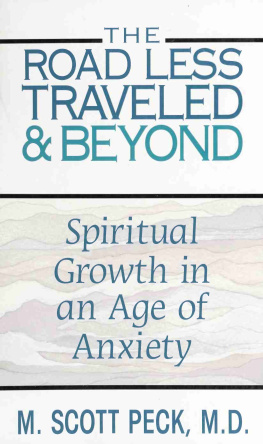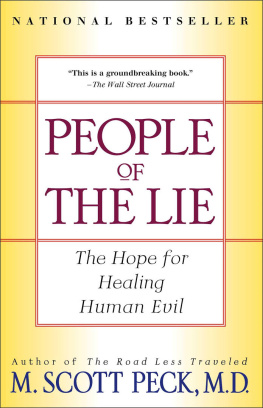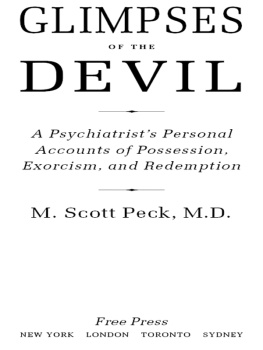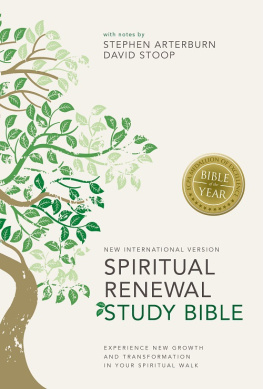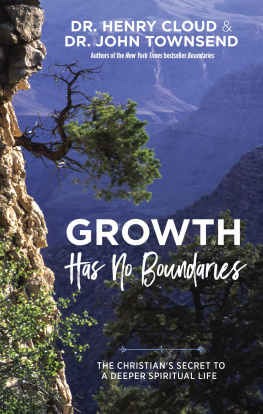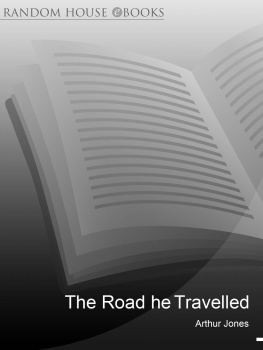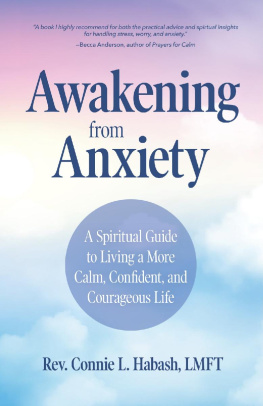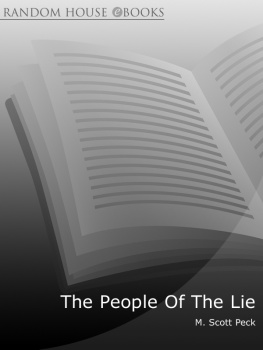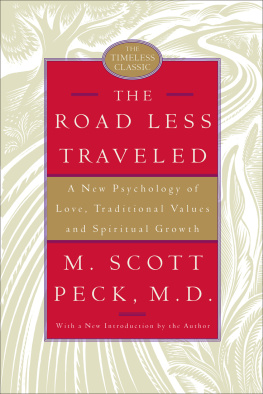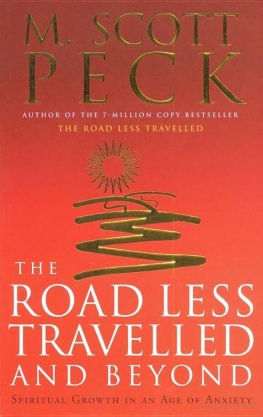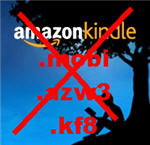Page numbers at the top of the page.
Made from LibGen md5=8E6114D5D06B93CA9BCAA2D3437C265F. OCR and text verification ABBYY Finereader 12. Html editing NotePad++. Epub version Sigil. Additional verifications on OL1004707M. No proofreading.
[UL] P2P Edition v. 1.0
2017.11.20

M. Scott Peck, M.D.

SIMON & SCHUSTER Rockefeller Center 1230 Avenue of the Americas
New York, NY 10020
Copyright 1997 by M. Scott Peck All rights reserved, including the right of reproduction in whole or in part in any form.
SIMON & SCHUSTER and colophon are registered trademarks of Simon & Schuster Inc.
Designed by Irving Perkins Associates
Manufactured in the United States of America
13579 10 8642
Library of Congress Cataloging-in-Publication Data Peck, M. Scott (Morgan Scott), date.
The road less traveled and beyond : spiritual growth in an age of anxiety / M. Scott Peck. p. cm.
Includes bibliographical references.
1. Spiritual life. 2. Peck, M. Scott (Morgan Scott), 1936-
I. Title.
BL624.P43 1997
158 dc20 96-43391
CIP
ISBN 0-684-81314-9
I acknowledge with gratitude the cooperation of all my publishers, including Bantam Books, Harper San Francisco, Harmony Books, Hyperion Books, Simon & Schuster, and Turner Publishing, for citations and quotations from my various books. Lyrics for "Can't Keep It In," by Cat Stevens, are reprinted by permission of Salafa Limited/Sony/ATV Music Publishing.
Contents
Introduction
Introduction Editor's Preface
PART I: CRUSADE AGAINST SIMPLISM
1: Thinking
The Point of Having a Brain Simplism and Society What's in Fashion Isn't Necessarily Fashionable Assumptions, Stereotypes, and Labeling Common Criminal Thinking Thinking Too Little Is Your Problem Thinking Too Much Is Somebody Else's Problem The Good, the Bad, and the In-between Thinking and Listening Freedom and Thinking Time and Efficiency Paradox and Thinking with Integrity
2: Consciousness
The Mystery of Consciousness Revisiting Our Frontal Lobes Lessons from Genesis 3 Good and Evil Evil, Sin, and Other Distinctions The Shadow Consciousness and Competence The Consciousness of Death Traveling with God [Page 8]
3: Learning and Growth
The Role of the Soul Passive Learning Growth and Will Out of Narcissism Narcissism Versus Self-love Narcissism, Death, and the Learning of Dying Unlearning and Flexibility Learning as Adventure Values and Learning Choices Learning from Role Models Group Learning
PART II: WRESTLING WITH THE COMPLEXITY OF EVERYDAY LIFE
4: Personal Life Choices
The Path of Smart Selfishness Versus the Path of Stupid Selfishness Choices of Responsibility Choices of Submission Choices of Vocation The Choice of Gratitude The Choice to Die Gracefully The Choice of Emptiness
5: Organizational Life Choices
Civility Systems Ethics Interdependence and Collaboration Accountability and Structure Boundaries and Vulnerability Power Culture Dysfunction Versus Civility
6: Choices About Society
The Paradox of Good and Evil The Paradox of Human Nature The Paradox of Entitlement The Paradox of Responsibility [Page 9] The Paradoxes of Time and Money A Personal Case Study
PART III: THE OTHER SIDE OF COMPLEXITY
7: The "Science" of God
Science and God Spirituality and Religion Stages of Spiritual Growth Psychospiritual and Historical Baggage Integration and Integrity Grace and Serendipity Revelation The Ego and the Soul Kenosis Prayer and Faith Process Theology Glory Cocreation
8: The "Poetry" of God
Acknowledgments
Notes
Introduction

I AM SIXTY YEARS OF AGE . That statistic means different things for different people. For me, since I am not in the best of health and feel I've lived enough for three lifetimes, being sixty means that it is time I should start setting my affairs in order, as they say. It seems proper for me these days to be about the business of tying up loose ends of my life insofar as it is in my power to do so. I write this book in that endeavor.
I wrote The Road Less Traveled at the vigorous age of forty. It was as if a spigot had been opened, and other books have come pouring out ever since: nine, to be exact, not counting this one. Each time people have asked me what I hoped to achieve by a particular book, as if I generally had a grand strategy in mind. The truth is I wrote them not out of strategy, but simply because each book has said, "Write me." However hard she might be to define, there is such a thing as a muse, and I have always and only operated under her orders.
So it is now, but I believe a more complex explanation is in order. One of those works, a collection of my edited lectures, is entitled Further Along the Road Less Traveled , as is the series of audiotapes from which it was developed. The tide of this one makes it sound like "The Road Less Traveled III." I worry the sound may be misleading. The fact is that my muse won't allow me to write the same book over and again no matter how commercially smart it might be to do so.
All of my books are quite different from each other. Yet not totally different. With the perspective of age I've come to real- [Page 12] ize that in their own unique ways they have all been attempts to work out the same complex set of hidden themes. Looking backward, recently I discerned that I have been wrestling with these themes as far back as I can remember. At the time it felt as if The Road Less Traveled arose de novo when I was forty. Now I can see how I'd begun work on it and my other books before I'd even entered adolescence. Perhaps I was born working on these themes. Or perhaps I was born to work on them. I don't know.
What I do know is that the work was already in progress of a sort two decades before the publication of The Road Less Traveled. In late 1957 and early 1958, at the age of twenty-one, I wrote a college senior thesis with the egregious title of "Anxiety, Modern Science, and the Epistemological Problem." Epistemology is that branch of philosophy which addresses the question: "How do we know what we think we know? How do we know anything?" The epistemological problem is that philosophers have never succeeded in answering the question. Many in the nineteenth century thought the answer lay in science. We could know things for certain through the scientific method. As my thesis pointed out, however, perhaps the single most important discovery of modern science has been that there are limits to scientific inquiry. With a few ifs, ands, and buts, there is no more real certainty to be found in science than in theology. Yet uncertainty breeds anxiety. It is scary when our best minds are those who best know that they don't know. This is why W. H. Auden referred to our century as the Age ofAnxiety a time when the Age of Reason has proved to be just as unsettling a period as the Age of Faith.

